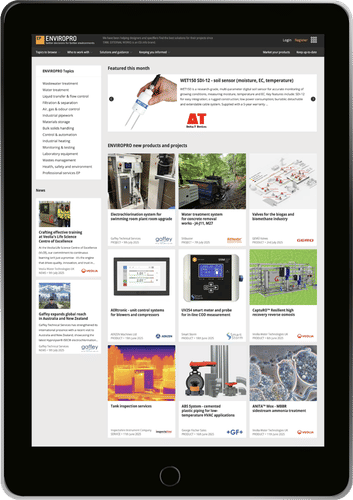- Sector
- Utilities
- Services provided
- Product manufacture
- Product supply
- Products used
- R480 butterfly valve series
Context
GEMÜ Great Britain helped a leading UK water company overcome persistent valve failures at its Clean Water sites by identifying root causes linked to poor seal design, over-specification and unsuitable materials of construction.
By introducing the GEMÜ R480 butterfly valve series, the customer achieved improved reliability, corrosion resistance and energy efficiency, supported by GEMÜ’s ongoing technical expertise and service.
Challenge
GEMÜ was approached by the water company to address persistent reliability issues at two of its Clean Water sites. The customer’s ultra-filtration plant was suffering from repeated valve failures, resulting in costly downtime and operation inefficiencies. Two main issues were identified:
Stem seal leaks: water ingress and air system contamination were causing actuators to fail, creating frequent breakdowns and raising health and safety concerns for operators.
Valve corrosion: corrosion of the existing valves led to contamination of the process media, excessive opening torques, and leakage, all of which compromised system performance and reliability.
Investigation
Following site visits and discussions, GEMÜ identified several underlying factors contributing to the valve issues.
The existing butterfly valves used relied on a single “U” cup seal design, which proved ineffective at retaining media when installed in a horizontal orientation leading to stem seal leaks.
In addition, the valves had been specified at 16 bar for a process operating at less than 6 bar. This over-specification increased actuator size and weight, placing unnecessary strain on the stem and resulting in higher opening torques.
Compounding these issues, the customer had also observed a steady decline in valve quality over the years, following changes in their valve supplier’s manufacturing processes.
The corrosion problems were also traced back to incorrect valve specification. The supplied butterfly valves incorporated a nylon-lined disc and an EPDM liner, both unsuitable for handling the corrosive nature of the CIP mixture used on site.
In addition, the valves lacked WRAS approval, further highlighting shortcomings in the supplier’s offering.
Solution
To resolve the challenges the customer faced, GEMÜ supplied the R480 butterfly valve series, specifically selected to address the issues on site. With its robust two-piece design, the R480 delivers bubble-tight sealing in accordance with EN 12266-1/P12, achieving a leak rate of A. By undercutting the discs to a 6–10 bar rating, GEMÜ was also able to reduce actuator size, lowering overall weight and improving torque efficiency.
The valve’s stainless steel disc, paired with a WRAS-approved EPDM liner, provided excellent protection against corrosion, while its streamlined disc design offered higher Kv values - helping to reduce energy costs.
The transition to the R480 series was met with strong approval from the customer, reinforced by their existing confidence in GEMÜ technology; a single GEMÜ D480 valve installed six years earlier had never leaked or caused any downtime for operators, underscoring the long-term reliability of GEMÜ's products compared to competitor alternatives.
Outcome
GEMÜ worked collaboratively with the customer to enhance their ultra-filtration plant performance across multiple sites, providing not only a high-quality technical solution but also dedicated support and ongoing customer service.
Testimonial
“Membrane filtration systems are very complex, computer-controlled assets. They must have the upmost integrity to prevent pathogens and chemicals from entering the filtered water. The two main causes of unreliability are high unseating torques and stem seal leaks. Virtually all the approved valves we have used over 25 years of service have had these issues. We have trialed GEMÜ valves for over six years and found them to be the most reliable valve available for this application.”
– Membranes Range Manager










